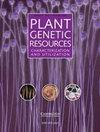Rice blast resistance gene profiling of Thai, Japanese and International rice varieties using gene-specific markers
IF 0.7
4区 生物学
Q3 PLANT SCIENCES
Plant Genetic Resources: Characterization and Utilization
Pub Date : 2022-05-12
DOI:10.1017/s1479262122000089
引用次数: 2
Abstract
Rice blast disease, caused by Magnaporthe oryzae, is one of the most damaging diseases of rice worldwide. Cultivation of rice varieties carrying resistance genes is the most economic and successful strategy to control the disease. In this study, 451 rice varieties from around the world including 363 Thai landrace rice varieties, 21 Thai improved rice varieties, 43 Japanese rice varieties and 24 worldwide rice varieties were screened by PCR technique using gene-specific markers for 10 rice blast resistance genes: Pi9, Piz-t, Pi50, Pigm(t), Pid2, Pid3, Pia, Pik, Pi54 and Pita. The results showed that 382 (99.48%) Thai rice varieties have at least one resistance gene and two rice varieties, ‘Hom’ and ‘Bak muay’, contained eight out of ten screened rice blast resistance genes. 320 rice varieties (83.33%) contained three or more rice blast resistance genes. The frequency of the rice blast resistance gene ranges from 87.76–9.64 per cent, of which the Pid3 gene has the highest frequency and the Pi54 gene has the lowest frequency. Two major resistance genes, found in Japanese rice varieties, are the Pik gene (76.74%) and the Pi9 gene (72.09%). While two major resistance genes, found in the international rice varieties are the Pi9 gene (66.67%) and the Pi54 gene (62.50%). The disease resistance gene profile of each rice variety obtained from this study will benefit the rice blast resistant breeding programme in the future.利用基因特异性标记分析泰国、日本和国际水稻品种抗稻瘟病基因
稻瘟病是由稻瘟病菌(Magnaporthe oryzae)引起的稻瘟病,是世界范围内危害最大的水稻病害之一。培育携带抗性基因的水稻品种是防治稻瘟病最经济、最成功的策略。本研究利用PCR技术对来自世界各地的451个水稻品种(包括363个泰国地方水稻品种、21个泰国改良水稻品种、43个日本水稻品种和24个世界水稻品种)的10个稻瘟病抗性基因(Pi9、pizt、Pi50、Pigm(t)、Pid2、Pid3、Pia、Pik、Pi54和Pita)进行了基因特异性标记筛选。结果表明,382个(99.48%)泰国水稻品种至少含有1个稻瘟病抗性基因,其中‘洪’和‘白梅’两个品种含有8个稻瘟病抗性基因。320个水稻品种(83.33%)含有3个或3个以上抗稻瘟病基因。稻瘟病抗性基因出现频率在87.76% ~ 9.64%之间,其中Pid3基因出现频率最高,Pi54基因出现频率最低。在日本水稻品种中发现的两个主要抗性基因是Pik基因(76.74%)和Pi9基因(72.09%)。在国际水稻品种中发现的两个主要抗性基因是Pi9基因(66.67%)和Pi54基因(62.50%)。本研究获得的每个水稻品种的抗病基因谱将有利于今后水稻抗稻瘟病育种计划的开展。
本文章由计算机程序翻译,如有差异,请以英文原文为准。
求助全文
约1分钟内获得全文
求助全文
来源期刊

Plant Genetic Resources: Characterization and Utilization
Agricultural and Biological Sciences-Agronomy and Crop Science
CiteScore
2.80
自引率
0.00%
发文量
29
审稿时长
>12 weeks
期刊介绍:
Plant Genetic Resources is an international journal which provides a forum for describing the application of novel genomic technologies, as well as their integration with established techniques, towards the understanding of the genetic variation captured in both in situ and ex situ collections of crop and non-crop plants; and for the airing of wider issues relevant to plant germplasm conservation and utilisation. We particularly welcome multi-disciplinary approaches that incorporate both a technical and a socio-economic focus. Technical aspects can cover developments in technologies of potential or demonstrated relevance to the analysis of variation and diversity at the phenotypic and genotypic levels.
 求助内容:
求助内容: 应助结果提醒方式:
应助结果提醒方式:


